Depiction of Personality Disorders in Media: Ethical and Social Impact
VerifiedAdded on 2022/08/18
|11
|2816
|33
Report
AI Summary
This report critically examines the depiction of personality disorders in mainstream media, including television and social media, focusing on the Singaporean context. It explores how media portrayals influence public perception, potentially leading to misunderstandings and stereotypes that can negatively impact individuals with these disorders. The report discusses the effects of media misrepresentation on diagnosis and treatment, highlighting the importance of accurate information. It also addresses ethical and legal issues that arise from inaccurate portrayals and provides recommendations for improving media representation. The report concludes with a personal reflection on the subject, emphasizing the need for media literacy and responsible content creation to foster a more informed and compassionate understanding of personality disorders. Finally, the report discusses the importance of diagnostic accuracy, and the role of various therapeutic approaches such as Cognitive Behavioral Therapy (CBT) and Dialectical Behavior Therapy (DBT).
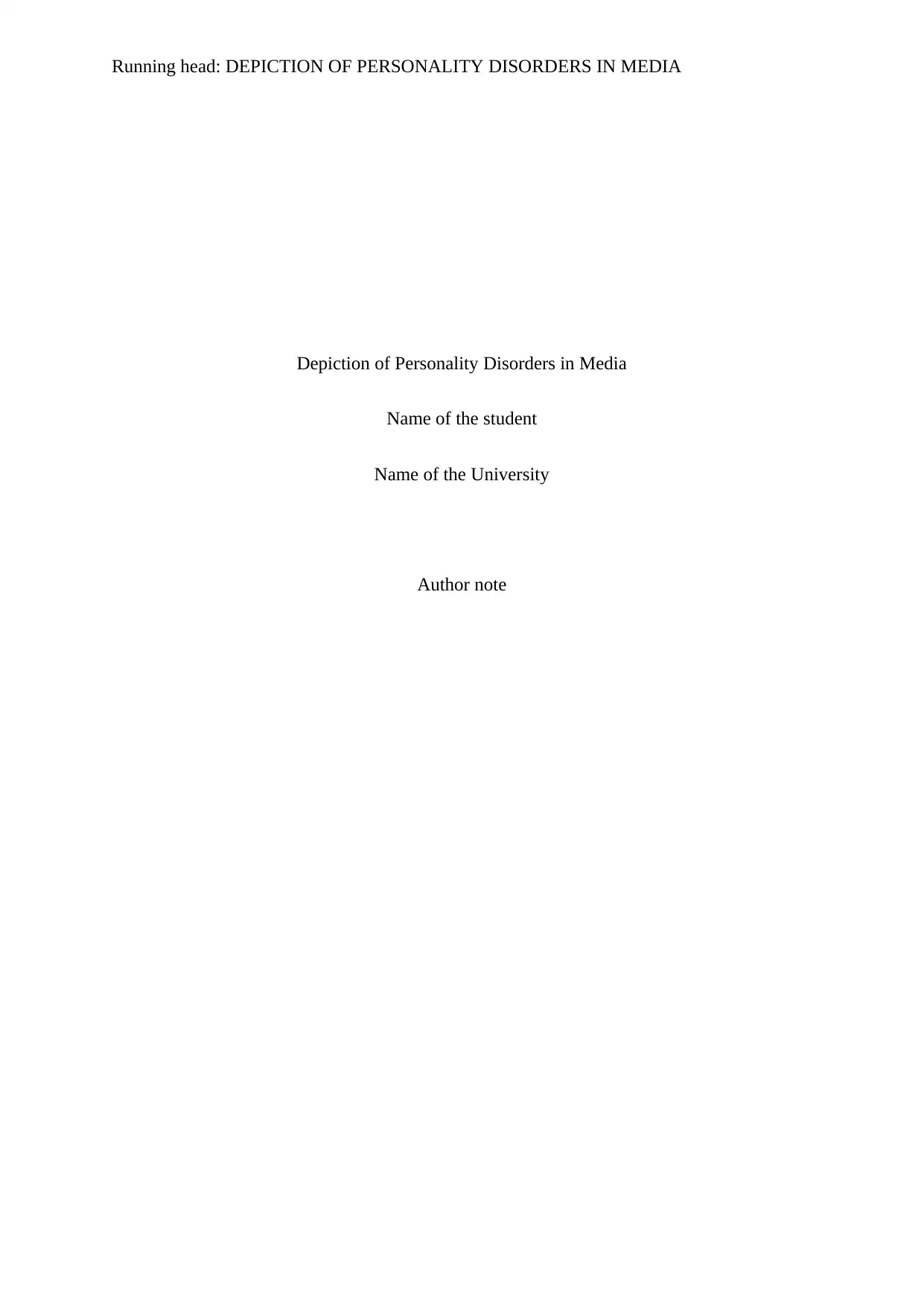
Running head: DEPICTION OF PERSONALITY DISORDERS IN MEDIA
Depiction of Personality Disorders in Media
Name of the student
Name of the University
Author note
Depiction of Personality Disorders in Media
Name of the student
Name of the University
Author note
Paraphrase This Document
Need a fresh take? Get an instant paraphrase of this document with our AI Paraphraser
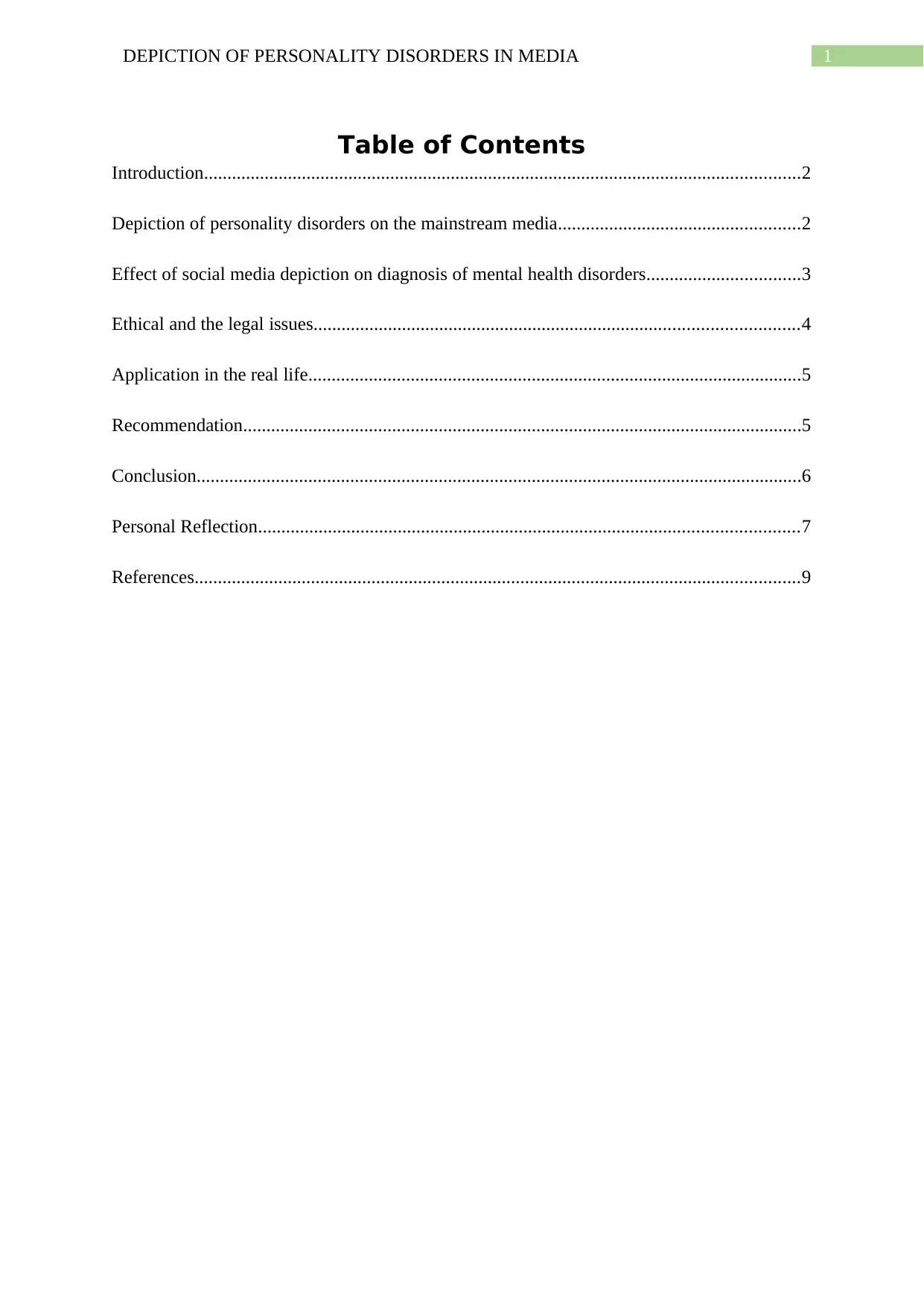
1DEPICTION OF PERSONALITY DISORDERS IN MEDIA
Table of Contents
Introduction................................................................................................................................2
Depiction of personality disorders on the mainstream media....................................................2
Effect of social media depiction on diagnosis of mental health disorders.................................3
Ethical and the legal issues........................................................................................................4
Application in the real life..........................................................................................................5
Recommendation........................................................................................................................5
Conclusion..................................................................................................................................6
Personal Reflection....................................................................................................................7
References..................................................................................................................................9
Table of Contents
Introduction................................................................................................................................2
Depiction of personality disorders on the mainstream media....................................................2
Effect of social media depiction on diagnosis of mental health disorders.................................3
Ethical and the legal issues........................................................................................................4
Application in the real life..........................................................................................................5
Recommendation........................................................................................................................5
Conclusion..................................................................................................................................6
Personal Reflection....................................................................................................................7
References..................................................................................................................................9
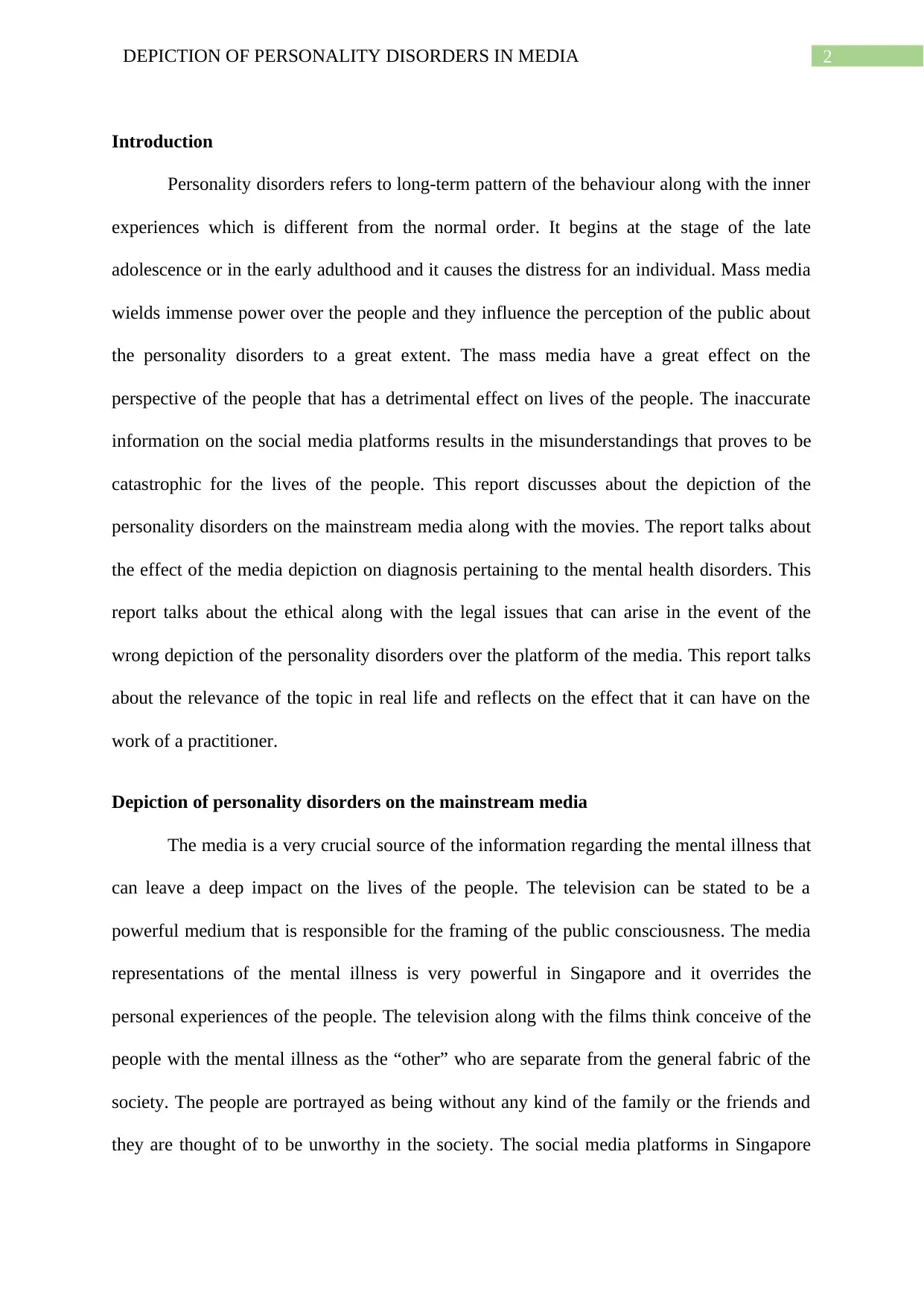
2DEPICTION OF PERSONALITY DISORDERS IN MEDIA
Introduction
Personality disorders refers to long-term pattern of the behaviour along with the inner
experiences which is different from the normal order. It begins at the stage of the late
adolescence or in the early adulthood and it causes the distress for an individual. Mass media
wields immense power over the people and they influence the perception of the public about
the personality disorders to a great extent. The mass media have a great effect on the
perspective of the people that has a detrimental effect on lives of the people. The inaccurate
information on the social media platforms results in the misunderstandings that proves to be
catastrophic for the lives of the people. This report discusses about the depiction of the
personality disorders on the mainstream media along with the movies. The report talks about
the effect of the media depiction on diagnosis pertaining to the mental health disorders. This
report talks about the ethical along with the legal issues that can arise in the event of the
wrong depiction of the personality disorders over the platform of the media. This report talks
about the relevance of the topic in real life and reflects on the effect that it can have on the
work of a practitioner.
Depiction of personality disorders on the mainstream media
The media is a very crucial source of the information regarding the mental illness that
can leave a deep impact on the lives of the people. The television can be stated to be a
powerful medium that is responsible for the framing of the public consciousness. The media
representations of the mental illness is very powerful in Singapore and it overrides the
personal experiences of the people. The television along with the films think conceive of the
people with the mental illness as the “other” who are separate from the general fabric of the
society. The people are portrayed as being without any kind of the family or the friends and
they are thought of to be unworthy in the society. The social media platforms in Singapore
Introduction
Personality disorders refers to long-term pattern of the behaviour along with the inner
experiences which is different from the normal order. It begins at the stage of the late
adolescence or in the early adulthood and it causes the distress for an individual. Mass media
wields immense power over the people and they influence the perception of the public about
the personality disorders to a great extent. The mass media have a great effect on the
perspective of the people that has a detrimental effect on lives of the people. The inaccurate
information on the social media platforms results in the misunderstandings that proves to be
catastrophic for the lives of the people. This report discusses about the depiction of the
personality disorders on the mainstream media along with the movies. The report talks about
the effect of the media depiction on diagnosis pertaining to the mental health disorders. This
report talks about the ethical along with the legal issues that can arise in the event of the
wrong depiction of the personality disorders over the platform of the media. This report talks
about the relevance of the topic in real life and reflects on the effect that it can have on the
work of a practitioner.
Depiction of personality disorders on the mainstream media
The media is a very crucial source of the information regarding the mental illness that
can leave a deep impact on the lives of the people. The television can be stated to be a
powerful medium that is responsible for the framing of the public consciousness. The media
representations of the mental illness is very powerful in Singapore and it overrides the
personal experiences of the people. The television along with the films think conceive of the
people with the mental illness as the “other” who are separate from the general fabric of the
society. The people are portrayed as being without any kind of the family or the friends and
they are thought of to be unworthy in the society. The social media platforms in Singapore
⊘ This is a preview!⊘
Do you want full access?
Subscribe today to unlock all pages.

Trusted by 1+ million students worldwide
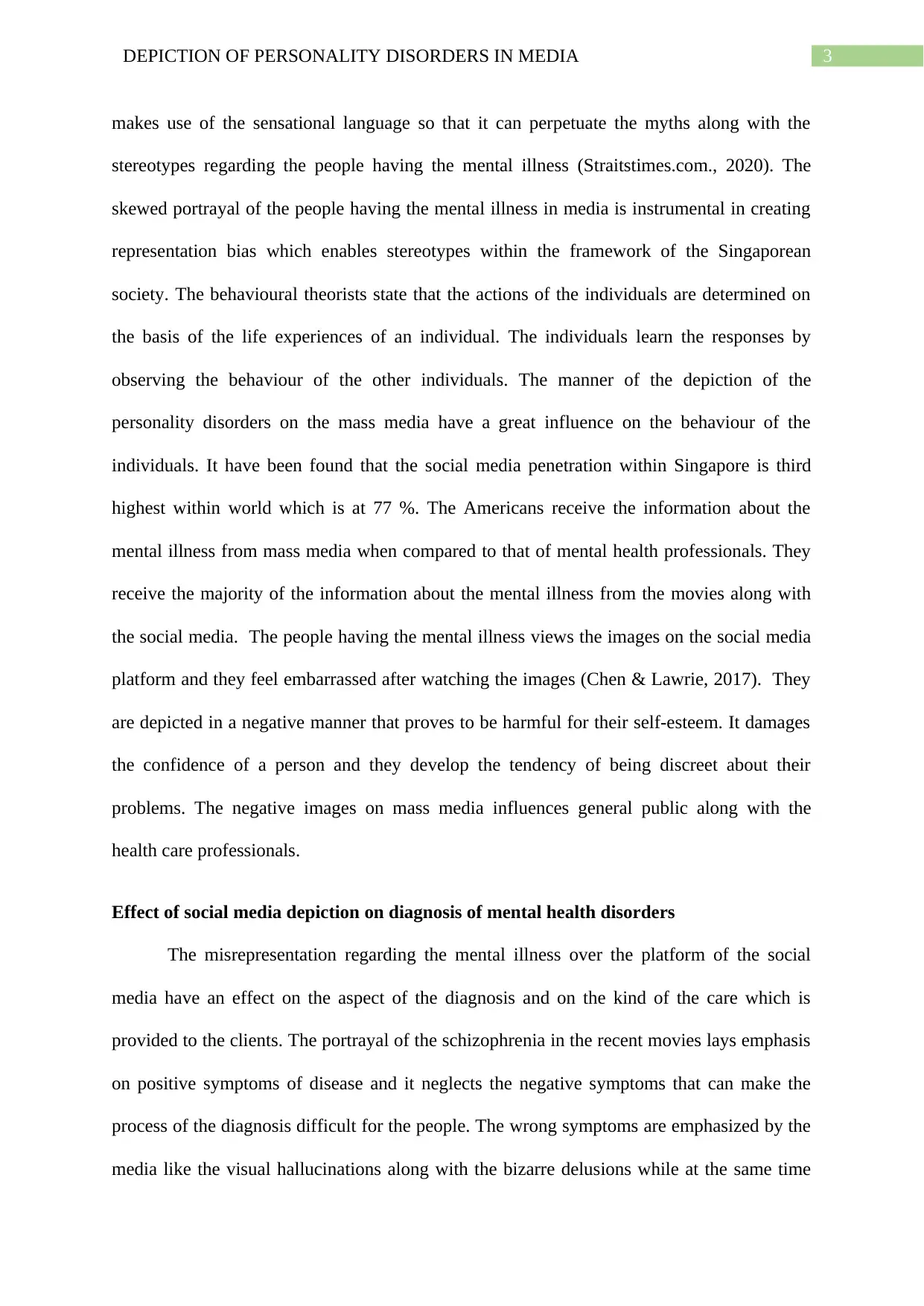
3DEPICTION OF PERSONALITY DISORDERS IN MEDIA
makes use of the sensational language so that it can perpetuate the myths along with the
stereotypes regarding the people having the mental illness (Straitstimes.com., 2020). The
skewed portrayal of the people having the mental illness in media is instrumental in creating
representation bias which enables stereotypes within the framework of the Singaporean
society. The behavioural theorists state that the actions of the individuals are determined on
the basis of the life experiences of an individual. The individuals learn the responses by
observing the behaviour of the other individuals. The manner of the depiction of the
personality disorders on the mass media have a great influence on the behaviour of the
individuals. It have been found that the social media penetration within Singapore is third
highest within world which is at 77 %. The Americans receive the information about the
mental illness from mass media when compared to that of mental health professionals. They
receive the majority of the information about the mental illness from the movies along with
the social media. The people having the mental illness views the images on the social media
platform and they feel embarrassed after watching the images (Chen & Lawrie, 2017). They
are depicted in a negative manner that proves to be harmful for their self-esteem. It damages
the confidence of a person and they develop the tendency of being discreet about their
problems. The negative images on mass media influences general public along with the
health care professionals.
Effect of social media depiction on diagnosis of mental health disorders
The misrepresentation regarding the mental illness over the platform of the social
media have an effect on the aspect of the diagnosis and on the kind of the care which is
provided to the clients. The portrayal of the schizophrenia in the recent movies lays emphasis
on positive symptoms of disease and it neglects the negative symptoms that can make the
process of the diagnosis difficult for the people. The wrong symptoms are emphasized by the
media like the visual hallucinations along with the bizarre delusions while at the same time
makes use of the sensational language so that it can perpetuate the myths along with the
stereotypes regarding the people having the mental illness (Straitstimes.com., 2020). The
skewed portrayal of the people having the mental illness in media is instrumental in creating
representation bias which enables stereotypes within the framework of the Singaporean
society. The behavioural theorists state that the actions of the individuals are determined on
the basis of the life experiences of an individual. The individuals learn the responses by
observing the behaviour of the other individuals. The manner of the depiction of the
personality disorders on the mass media have a great influence on the behaviour of the
individuals. It have been found that the social media penetration within Singapore is third
highest within world which is at 77 %. The Americans receive the information about the
mental illness from mass media when compared to that of mental health professionals. They
receive the majority of the information about the mental illness from the movies along with
the social media. The people having the mental illness views the images on the social media
platform and they feel embarrassed after watching the images (Chen & Lawrie, 2017). They
are depicted in a negative manner that proves to be harmful for their self-esteem. It damages
the confidence of a person and they develop the tendency of being discreet about their
problems. The negative images on mass media influences general public along with the
health care professionals.
Effect of social media depiction on diagnosis of mental health disorders
The misrepresentation regarding the mental illness over the platform of the social
media have an effect on the aspect of the diagnosis and on the kind of the care which is
provided to the clients. The portrayal of the schizophrenia in the recent movies lays emphasis
on positive symptoms of disease and it neglects the negative symptoms that can make the
process of the diagnosis difficult for the people. The wrong symptoms are emphasized by the
media like the visual hallucinations along with the bizarre delusions while at the same time
Paraphrase This Document
Need a fresh take? Get an instant paraphrase of this document with our AI Paraphraser
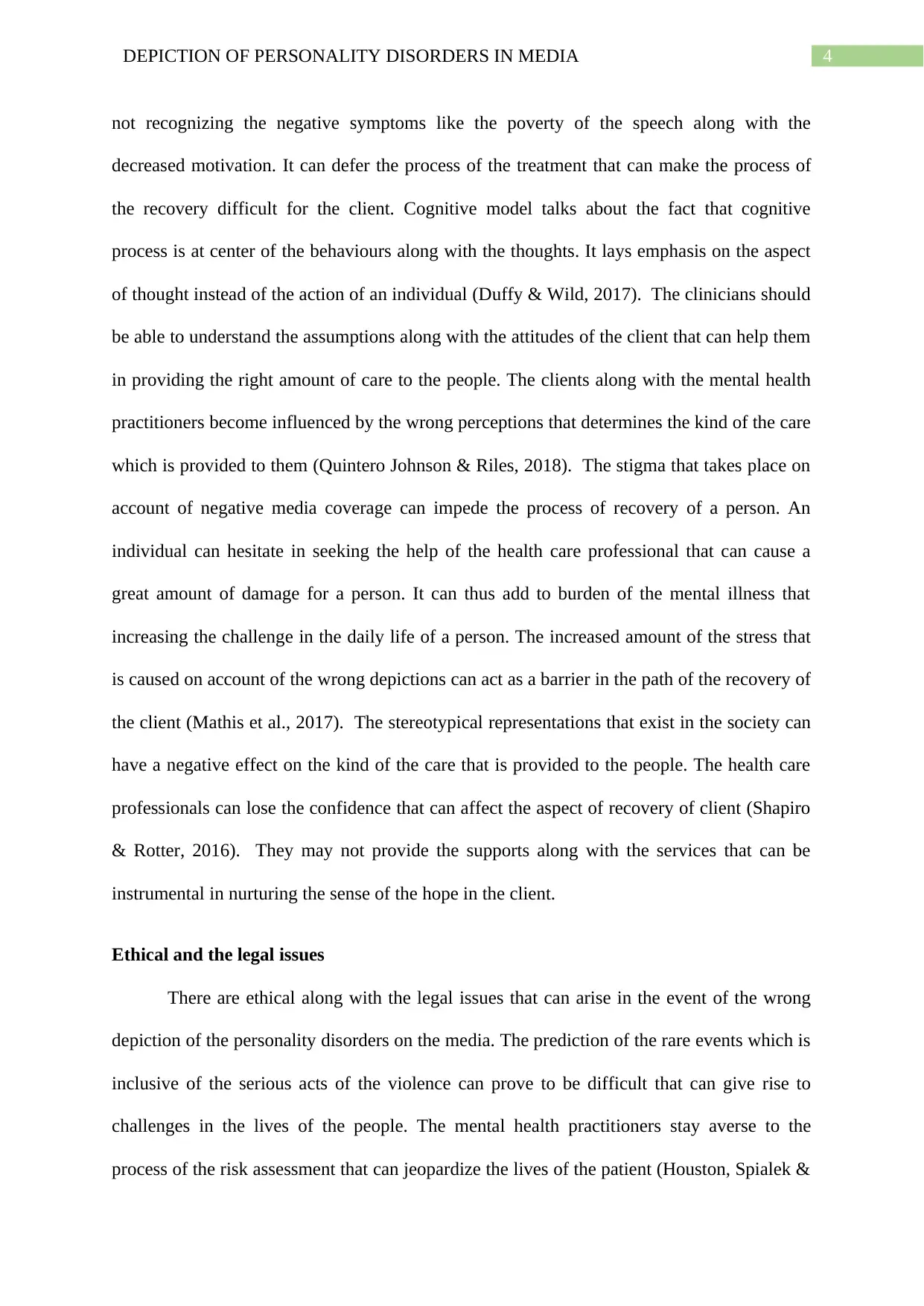
4DEPICTION OF PERSONALITY DISORDERS IN MEDIA
not recognizing the negative symptoms like the poverty of the speech along with the
decreased motivation. It can defer the process of the treatment that can make the process of
the recovery difficult for the client. Cognitive model talks about the fact that cognitive
process is at center of the behaviours along with the thoughts. It lays emphasis on the aspect
of thought instead of the action of an individual (Duffy & Wild, 2017). The clinicians should
be able to understand the assumptions along with the attitudes of the client that can help them
in providing the right amount of care to the people. The clients along with the mental health
practitioners become influenced by the wrong perceptions that determines the kind of the care
which is provided to them (Quintero Johnson & Riles, 2018). The stigma that takes place on
account of negative media coverage can impede the process of recovery of a person. An
individual can hesitate in seeking the help of the health care professional that can cause a
great amount of damage for a person. It can thus add to burden of the mental illness that
increasing the challenge in the daily life of a person. The increased amount of the stress that
is caused on account of the wrong depictions can act as a barrier in the path of the recovery of
the client (Mathis et al., 2017). The stereotypical representations that exist in the society can
have a negative effect on the kind of the care that is provided to the people. The health care
professionals can lose the confidence that can affect the aspect of recovery of client (Shapiro
& Rotter, 2016). They may not provide the supports along with the services that can be
instrumental in nurturing the sense of the hope in the client.
Ethical and the legal issues
There are ethical along with the legal issues that can arise in the event of the wrong
depiction of the personality disorders on the media. The prediction of the rare events which is
inclusive of the serious acts of the violence can prove to be difficult that can give rise to
challenges in the lives of the people. The mental health practitioners stay averse to the
process of the risk assessment that can jeopardize the lives of the patient (Houston, Spialek &
not recognizing the negative symptoms like the poverty of the speech along with the
decreased motivation. It can defer the process of the treatment that can make the process of
the recovery difficult for the client. Cognitive model talks about the fact that cognitive
process is at center of the behaviours along with the thoughts. It lays emphasis on the aspect
of thought instead of the action of an individual (Duffy & Wild, 2017). The clinicians should
be able to understand the assumptions along with the attitudes of the client that can help them
in providing the right amount of care to the people. The clients along with the mental health
practitioners become influenced by the wrong perceptions that determines the kind of the care
which is provided to them (Quintero Johnson & Riles, 2018). The stigma that takes place on
account of negative media coverage can impede the process of recovery of a person. An
individual can hesitate in seeking the help of the health care professional that can cause a
great amount of damage for a person. It can thus add to burden of the mental illness that
increasing the challenge in the daily life of a person. The increased amount of the stress that
is caused on account of the wrong depictions can act as a barrier in the path of the recovery of
the client (Mathis et al., 2017). The stereotypical representations that exist in the society can
have a negative effect on the kind of the care that is provided to the people. The health care
professionals can lose the confidence that can affect the aspect of recovery of client (Shapiro
& Rotter, 2016). They may not provide the supports along with the services that can be
instrumental in nurturing the sense of the hope in the client.
Ethical and the legal issues
There are ethical along with the legal issues that can arise in the event of the wrong
depiction of the personality disorders on the media. The prediction of the rare events which is
inclusive of the serious acts of the violence can prove to be difficult that can give rise to
challenges in the lives of the people. The mental health practitioners stay averse to the
process of the risk assessment that can jeopardize the lives of the patient (Houston, Spialek &
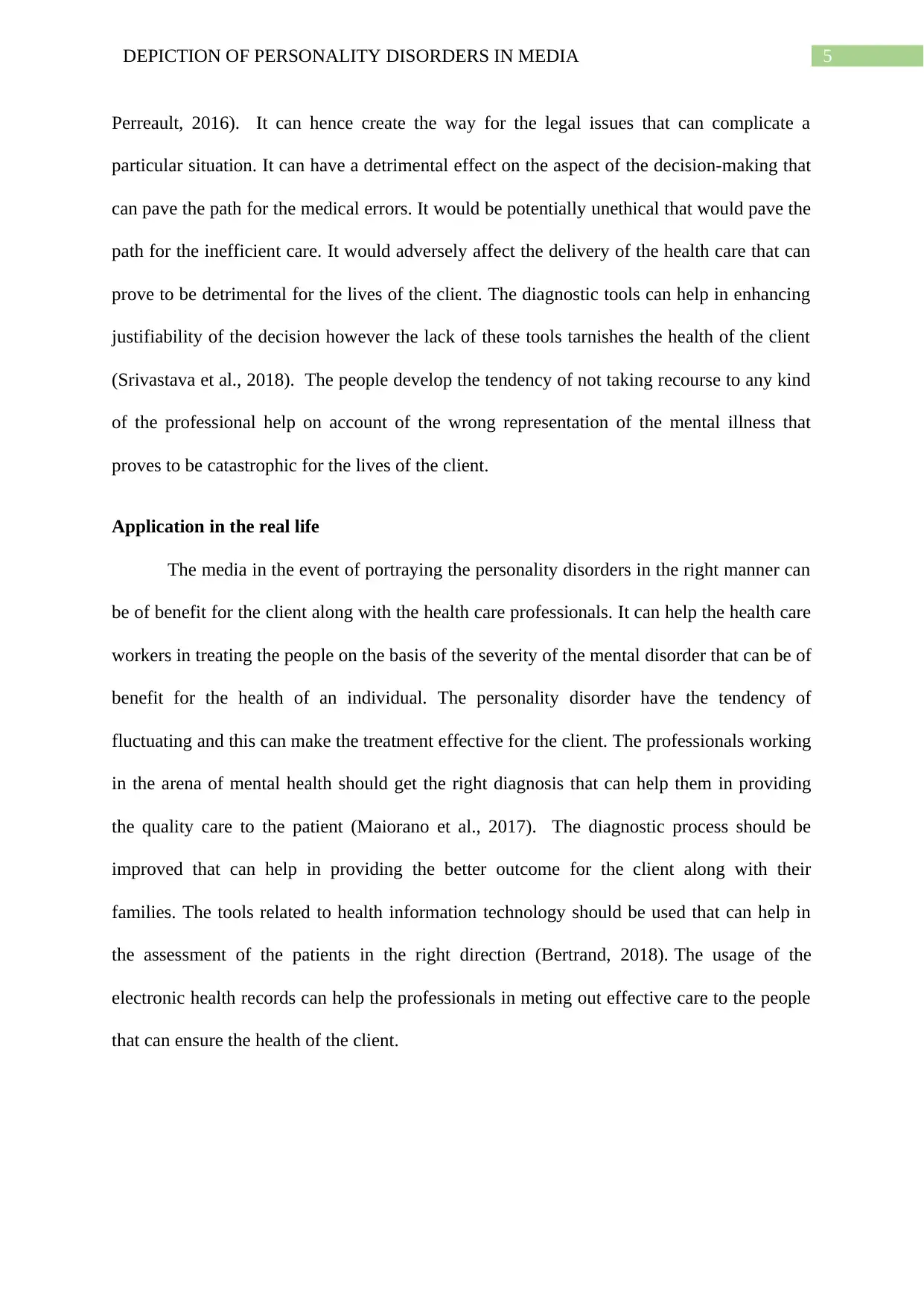
5DEPICTION OF PERSONALITY DISORDERS IN MEDIA
Perreault, 2016). It can hence create the way for the legal issues that can complicate a
particular situation. It can have a detrimental effect on the aspect of the decision-making that
can pave the path for the medical errors. It would be potentially unethical that would pave the
path for the inefficient care. It would adversely affect the delivery of the health care that can
prove to be detrimental for the lives of the client. The diagnostic tools can help in enhancing
justifiability of the decision however the lack of these tools tarnishes the health of the client
(Srivastava et al., 2018). The people develop the tendency of not taking recourse to any kind
of the professional help on account of the wrong representation of the mental illness that
proves to be catastrophic for the lives of the client.
Application in the real life
The media in the event of portraying the personality disorders in the right manner can
be of benefit for the client along with the health care professionals. It can help the health care
workers in treating the people on the basis of the severity of the mental disorder that can be of
benefit for the health of an individual. The personality disorder have the tendency of
fluctuating and this can make the treatment effective for the client. The professionals working
in the arena of mental health should get the right diagnosis that can help them in providing
the quality care to the patient (Maiorano et al., 2017). The diagnostic process should be
improved that can help in providing the better outcome for the client along with their
families. The tools related to health information technology should be used that can help in
the assessment of the patients in the right direction (Bertrand, 2018). The usage of the
electronic health records can help the professionals in meting out effective care to the people
that can ensure the health of the client.
Perreault, 2016). It can hence create the way for the legal issues that can complicate a
particular situation. It can have a detrimental effect on the aspect of the decision-making that
can pave the path for the medical errors. It would be potentially unethical that would pave the
path for the inefficient care. It would adversely affect the delivery of the health care that can
prove to be detrimental for the lives of the client. The diagnostic tools can help in enhancing
justifiability of the decision however the lack of these tools tarnishes the health of the client
(Srivastava et al., 2018). The people develop the tendency of not taking recourse to any kind
of the professional help on account of the wrong representation of the mental illness that
proves to be catastrophic for the lives of the client.
Application in the real life
The media in the event of portraying the personality disorders in the right manner can
be of benefit for the client along with the health care professionals. It can help the health care
workers in treating the people on the basis of the severity of the mental disorder that can be of
benefit for the health of an individual. The personality disorder have the tendency of
fluctuating and this can make the treatment effective for the client. The professionals working
in the arena of mental health should get the right diagnosis that can help them in providing
the quality care to the patient (Maiorano et al., 2017). The diagnostic process should be
improved that can help in providing the better outcome for the client along with their
families. The tools related to health information technology should be used that can help in
the assessment of the patients in the right direction (Bertrand, 2018). The usage of the
electronic health records can help the professionals in meting out effective care to the people
that can ensure the health of the client.
⊘ This is a preview!⊘
Do you want full access?
Subscribe today to unlock all pages.

Trusted by 1+ million students worldwide
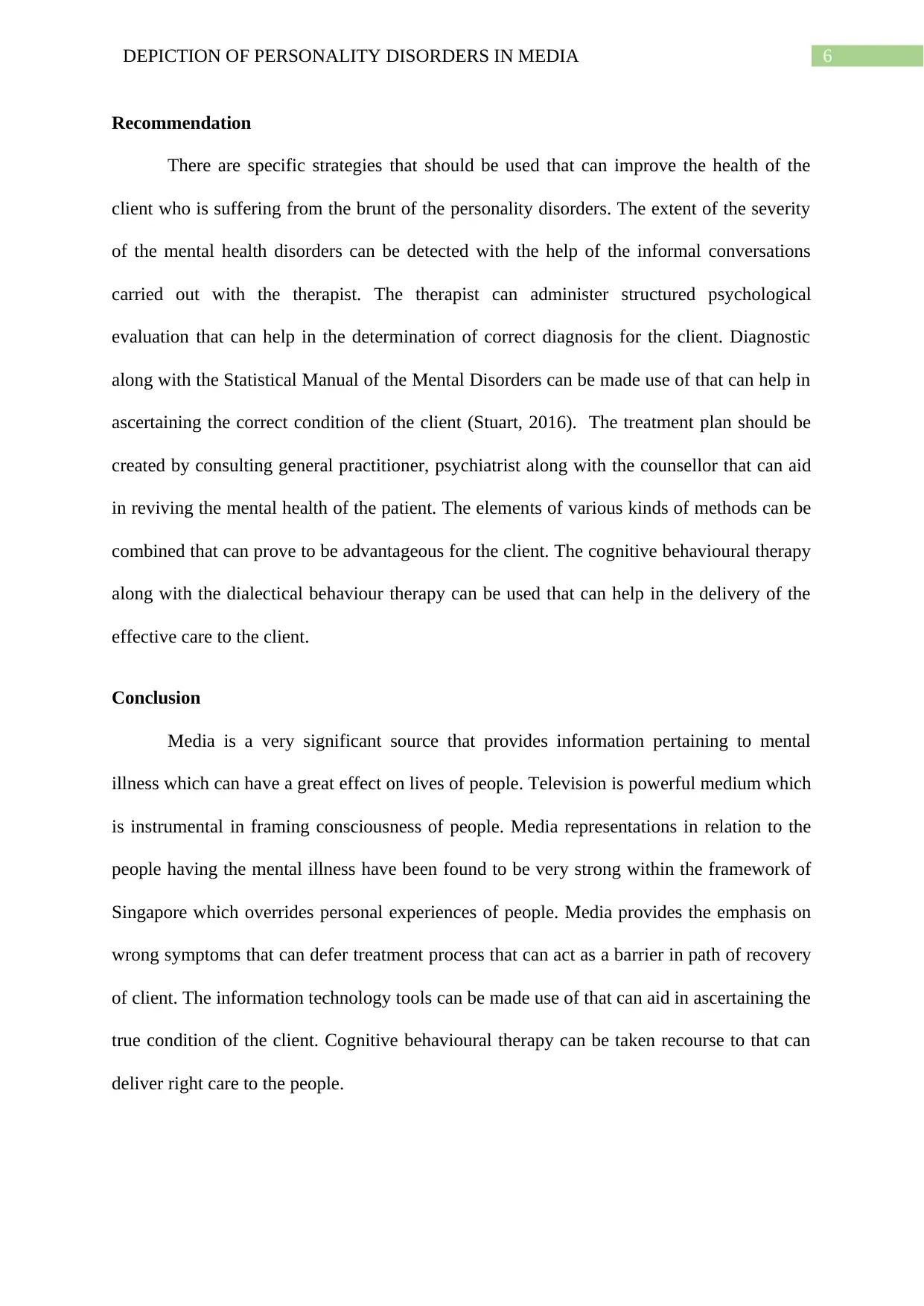
6DEPICTION OF PERSONALITY DISORDERS IN MEDIA
Recommendation
There are specific strategies that should be used that can improve the health of the
client who is suffering from the brunt of the personality disorders. The extent of the severity
of the mental health disorders can be detected with the help of the informal conversations
carried out with the therapist. The therapist can administer structured psychological
evaluation that can help in the determination of correct diagnosis for the client. Diagnostic
along with the Statistical Manual of the Mental Disorders can be made use of that can help in
ascertaining the correct condition of the client (Stuart, 2016). The treatment plan should be
created by consulting general practitioner, psychiatrist along with the counsellor that can aid
in reviving the mental health of the patient. The elements of various kinds of methods can be
combined that can prove to be advantageous for the client. The cognitive behavioural therapy
along with the dialectical behaviour therapy can be used that can help in the delivery of the
effective care to the client.
Conclusion
Media is a very significant source that provides information pertaining to mental
illness which can have a great effect on lives of people. Television is powerful medium which
is instrumental in framing consciousness of people. Media representations in relation to the
people having the mental illness have been found to be very strong within the framework of
Singapore which overrides personal experiences of people. Media provides the emphasis on
wrong symptoms that can defer treatment process that can act as a barrier in path of recovery
of client. The information technology tools can be made use of that can aid in ascertaining the
true condition of the client. Cognitive behavioural therapy can be taken recourse to that can
deliver right care to the people.
Recommendation
There are specific strategies that should be used that can improve the health of the
client who is suffering from the brunt of the personality disorders. The extent of the severity
of the mental health disorders can be detected with the help of the informal conversations
carried out with the therapist. The therapist can administer structured psychological
evaluation that can help in the determination of correct diagnosis for the client. Diagnostic
along with the Statistical Manual of the Mental Disorders can be made use of that can help in
ascertaining the correct condition of the client (Stuart, 2016). The treatment plan should be
created by consulting general practitioner, psychiatrist along with the counsellor that can aid
in reviving the mental health of the patient. The elements of various kinds of methods can be
combined that can prove to be advantageous for the client. The cognitive behavioural therapy
along with the dialectical behaviour therapy can be used that can help in the delivery of the
effective care to the client.
Conclusion
Media is a very significant source that provides information pertaining to mental
illness which can have a great effect on lives of people. Television is powerful medium which
is instrumental in framing consciousness of people. Media representations in relation to the
people having the mental illness have been found to be very strong within the framework of
Singapore which overrides personal experiences of people. Media provides the emphasis on
wrong symptoms that can defer treatment process that can act as a barrier in path of recovery
of client. The information technology tools can be made use of that can aid in ascertaining the
true condition of the client. Cognitive behavioural therapy can be taken recourse to that can
deliver right care to the people.
Paraphrase This Document
Need a fresh take? Get an instant paraphrase of this document with our AI Paraphraser
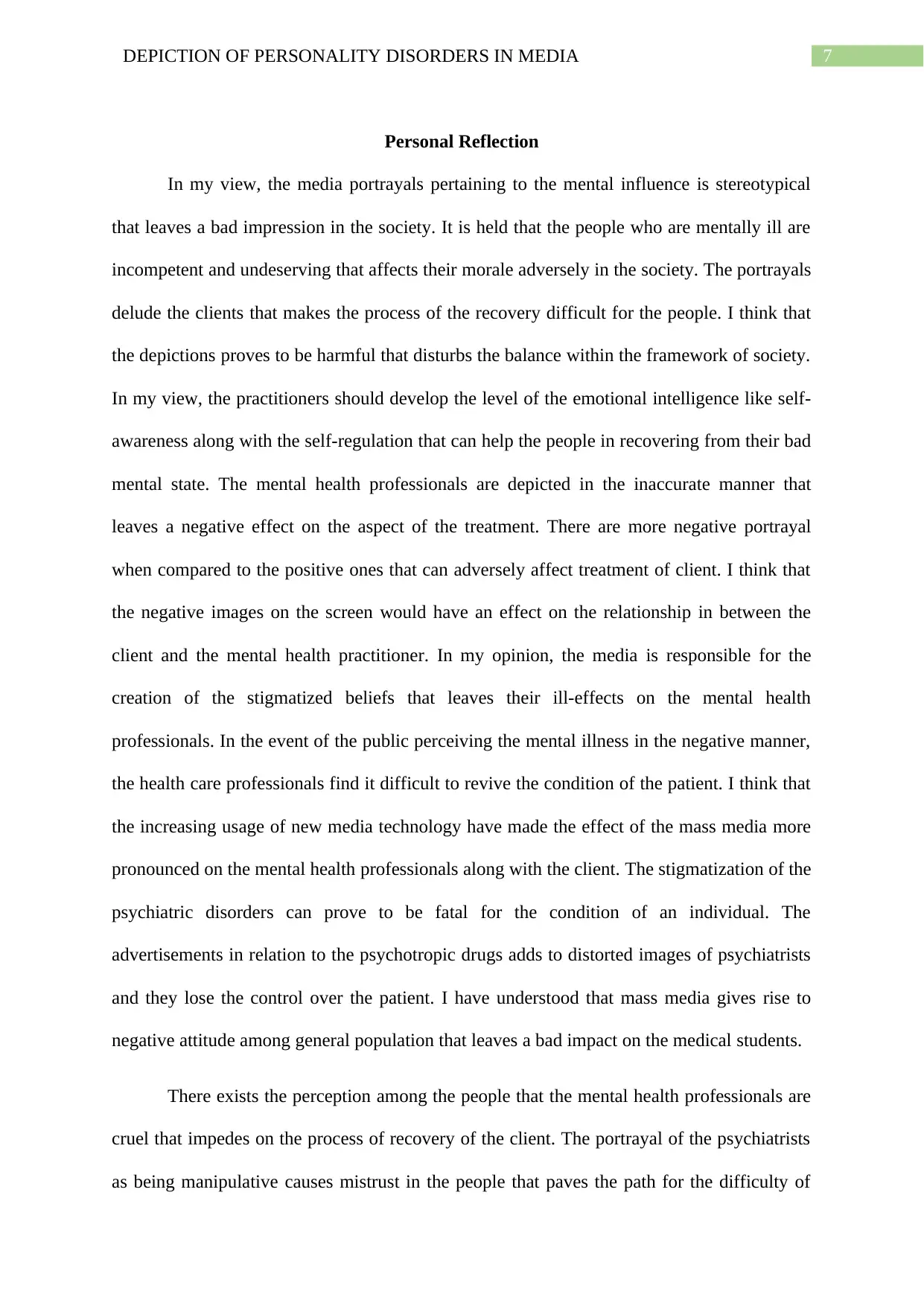
7DEPICTION OF PERSONALITY DISORDERS IN MEDIA
Personal Reflection
In my view, the media portrayals pertaining to the mental influence is stereotypical
that leaves a bad impression in the society. It is held that the people who are mentally ill are
incompetent and undeserving that affects their morale adversely in the society. The portrayals
delude the clients that makes the process of the recovery difficult for the people. I think that
the depictions proves to be harmful that disturbs the balance within the framework of society.
In my view, the practitioners should develop the level of the emotional intelligence like self-
awareness along with the self-regulation that can help the people in recovering from their bad
mental state. The mental health professionals are depicted in the inaccurate manner that
leaves a negative effect on the aspect of the treatment. There are more negative portrayal
when compared to the positive ones that can adversely affect treatment of client. I think that
the negative images on the screen would have an effect on the relationship in between the
client and the mental health practitioner. In my opinion, the media is responsible for the
creation of the stigmatized beliefs that leaves their ill-effects on the mental health
professionals. In the event of the public perceiving the mental illness in the negative manner,
the health care professionals find it difficult to revive the condition of the patient. I think that
the increasing usage of new media technology have made the effect of the mass media more
pronounced on the mental health professionals along with the client. The stigmatization of the
psychiatric disorders can prove to be fatal for the condition of an individual. The
advertisements in relation to the psychotropic drugs adds to distorted images of psychiatrists
and they lose the control over the patient. I have understood that mass media gives rise to
negative attitude among general population that leaves a bad impact on the medical students.
There exists the perception among the people that the mental health professionals are
cruel that impedes on the process of recovery of the client. The portrayal of the psychiatrists
as being manipulative causes mistrust in the people that paves the path for the difficulty of
Personal Reflection
In my view, the media portrayals pertaining to the mental influence is stereotypical
that leaves a bad impression in the society. It is held that the people who are mentally ill are
incompetent and undeserving that affects their morale adversely in the society. The portrayals
delude the clients that makes the process of the recovery difficult for the people. I think that
the depictions proves to be harmful that disturbs the balance within the framework of society.
In my view, the practitioners should develop the level of the emotional intelligence like self-
awareness along with the self-regulation that can help the people in recovering from their bad
mental state. The mental health professionals are depicted in the inaccurate manner that
leaves a negative effect on the aspect of the treatment. There are more negative portrayal
when compared to the positive ones that can adversely affect treatment of client. I think that
the negative images on the screen would have an effect on the relationship in between the
client and the mental health practitioner. In my opinion, the media is responsible for the
creation of the stigmatized beliefs that leaves their ill-effects on the mental health
professionals. In the event of the public perceiving the mental illness in the negative manner,
the health care professionals find it difficult to revive the condition of the patient. I think that
the increasing usage of new media technology have made the effect of the mass media more
pronounced on the mental health professionals along with the client. The stigmatization of the
psychiatric disorders can prove to be fatal for the condition of an individual. The
advertisements in relation to the psychotropic drugs adds to distorted images of psychiatrists
and they lose the control over the patient. I have understood that mass media gives rise to
negative attitude among general population that leaves a bad impact on the medical students.
There exists the perception among the people that the mental health professionals are
cruel that impedes on the process of recovery of the client. The portrayal of the psychiatrists
as being manipulative causes mistrust in the people that paves the path for the difficulty of
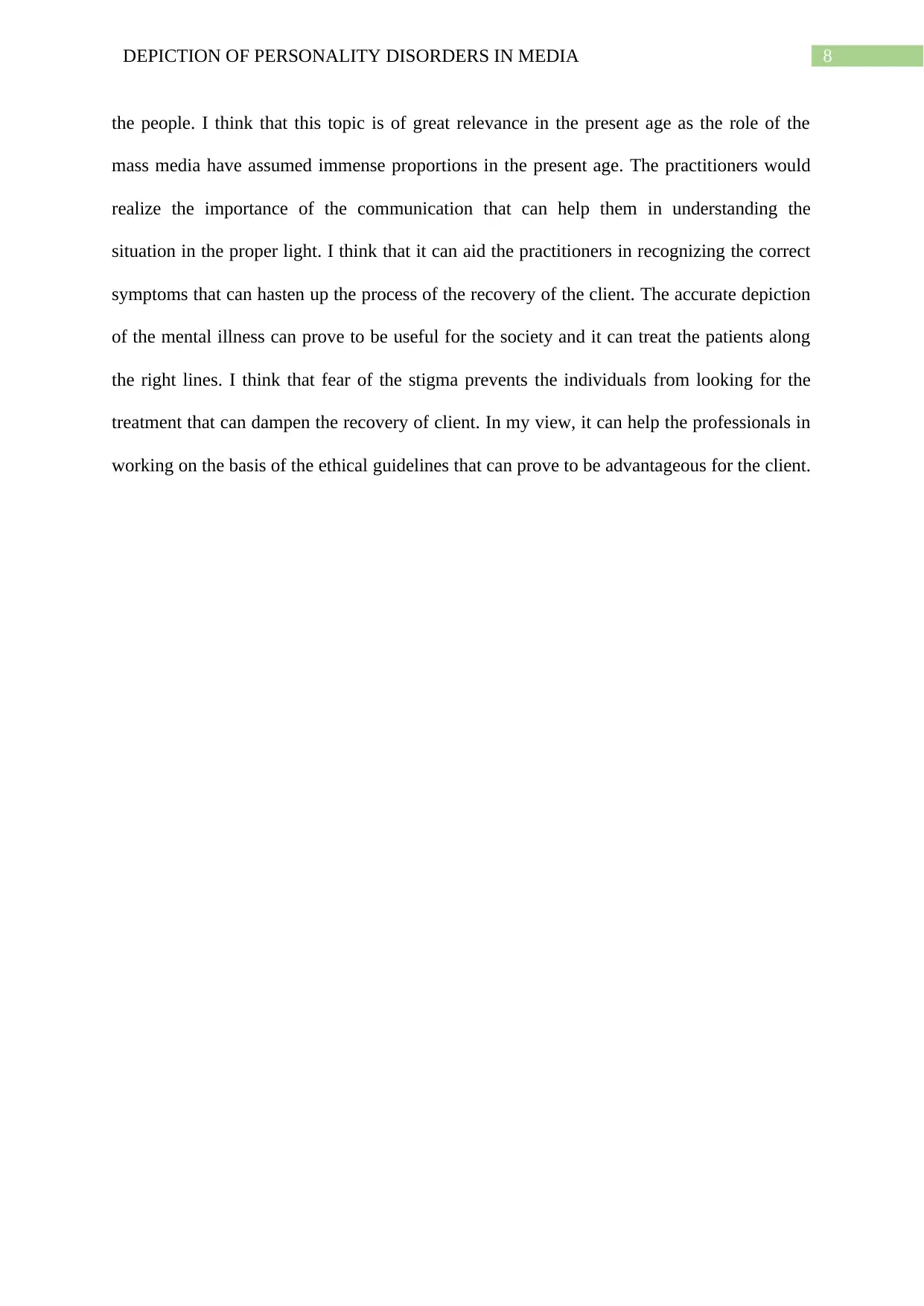
8DEPICTION OF PERSONALITY DISORDERS IN MEDIA
the people. I think that this topic is of great relevance in the present age as the role of the
mass media have assumed immense proportions in the present age. The practitioners would
realize the importance of the communication that can help them in understanding the
situation in the proper light. I think that it can aid the practitioners in recognizing the correct
symptoms that can hasten up the process of the recovery of the client. The accurate depiction
of the mental illness can prove to be useful for the society and it can treat the patients along
the right lines. I think that fear of the stigma prevents the individuals from looking for the
treatment that can dampen the recovery of client. In my view, it can help the professionals in
working on the basis of the ethical guidelines that can prove to be advantageous for the client.
the people. I think that this topic is of great relevance in the present age as the role of the
mass media have assumed immense proportions in the present age. The practitioners would
realize the importance of the communication that can help them in understanding the
situation in the proper light. I think that it can aid the practitioners in recognizing the correct
symptoms that can hasten up the process of the recovery of the client. The accurate depiction
of the mental illness can prove to be useful for the society and it can treat the patients along
the right lines. I think that fear of the stigma prevents the individuals from looking for the
treatment that can dampen the recovery of client. In my view, it can help the professionals in
working on the basis of the ethical guidelines that can prove to be advantageous for the client.
⊘ This is a preview!⊘
Do you want full access?
Subscribe today to unlock all pages.

Trusted by 1+ million students worldwide
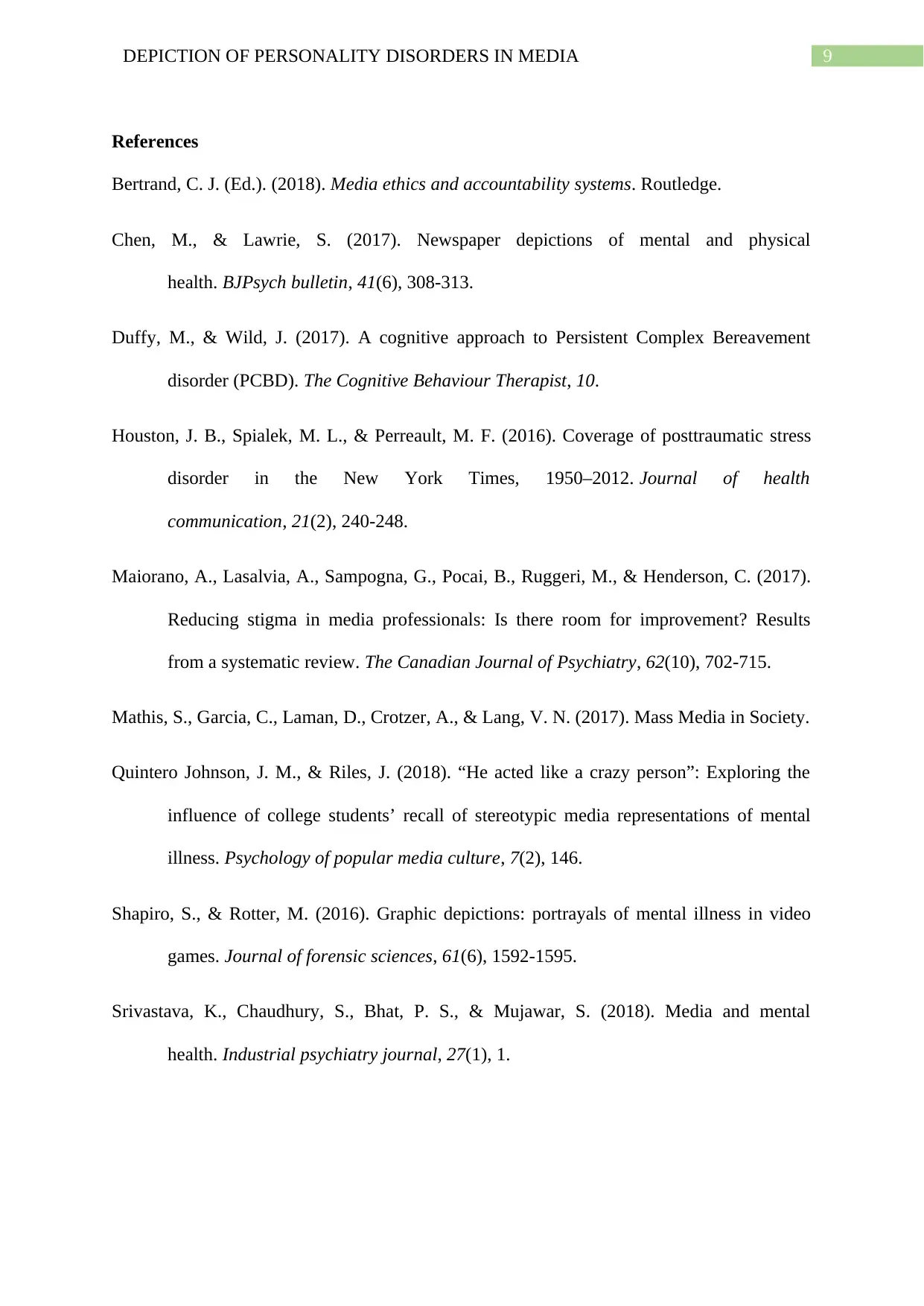
9DEPICTION OF PERSONALITY DISORDERS IN MEDIA
References
Bertrand, C. J. (Ed.). (2018). Media ethics and accountability systems. Routledge.
Chen, M., & Lawrie, S. (2017). Newspaper depictions of mental and physical
health. BJPsych bulletin, 41(6), 308-313.
Duffy, M., & Wild, J. (2017). A cognitive approach to Persistent Complex Bereavement
disorder (PCBD). The Cognitive Behaviour Therapist, 10.
Houston, J. B., Spialek, M. L., & Perreault, M. F. (2016). Coverage of posttraumatic stress
disorder in the New York Times, 1950–2012. Journal of health
communication, 21(2), 240-248.
Maiorano, A., Lasalvia, A., Sampogna, G., Pocai, B., Ruggeri, M., & Henderson, C. (2017).
Reducing stigma in media professionals: Is there room for improvement? Results
from a systematic review. The Canadian Journal of Psychiatry, 62(10), 702-715.
Mathis, S., Garcia, C., Laman, D., Crotzer, A., & Lang, V. N. (2017). Mass Media in Society.
Quintero Johnson, J. M., & Riles, J. (2018). “He acted like a crazy person”: Exploring the
influence of college students’ recall of stereotypic media representations of mental
illness. Psychology of popular media culture, 7(2), 146.
Shapiro, S., & Rotter, M. (2016). Graphic depictions: portrayals of mental illness in video
games. Journal of forensic sciences, 61(6), 1592-1595.
Srivastava, K., Chaudhury, S., Bhat, P. S., & Mujawar, S. (2018). Media and mental
health. Industrial psychiatry journal, 27(1), 1.
References
Bertrand, C. J. (Ed.). (2018). Media ethics and accountability systems. Routledge.
Chen, M., & Lawrie, S. (2017). Newspaper depictions of mental and physical
health. BJPsych bulletin, 41(6), 308-313.
Duffy, M., & Wild, J. (2017). A cognitive approach to Persistent Complex Bereavement
disorder (PCBD). The Cognitive Behaviour Therapist, 10.
Houston, J. B., Spialek, M. L., & Perreault, M. F. (2016). Coverage of posttraumatic stress
disorder in the New York Times, 1950–2012. Journal of health
communication, 21(2), 240-248.
Maiorano, A., Lasalvia, A., Sampogna, G., Pocai, B., Ruggeri, M., & Henderson, C. (2017).
Reducing stigma in media professionals: Is there room for improvement? Results
from a systematic review. The Canadian Journal of Psychiatry, 62(10), 702-715.
Mathis, S., Garcia, C., Laman, D., Crotzer, A., & Lang, V. N. (2017). Mass Media in Society.
Quintero Johnson, J. M., & Riles, J. (2018). “He acted like a crazy person”: Exploring the
influence of college students’ recall of stereotypic media representations of mental
illness. Psychology of popular media culture, 7(2), 146.
Shapiro, S., & Rotter, M. (2016). Graphic depictions: portrayals of mental illness in video
games. Journal of forensic sciences, 61(6), 1592-1595.
Srivastava, K., Chaudhury, S., Bhat, P. S., & Mujawar, S. (2018). Media and mental
health. Industrial psychiatry journal, 27(1), 1.
Paraphrase This Document
Need a fresh take? Get an instant paraphrase of this document with our AI Paraphraser
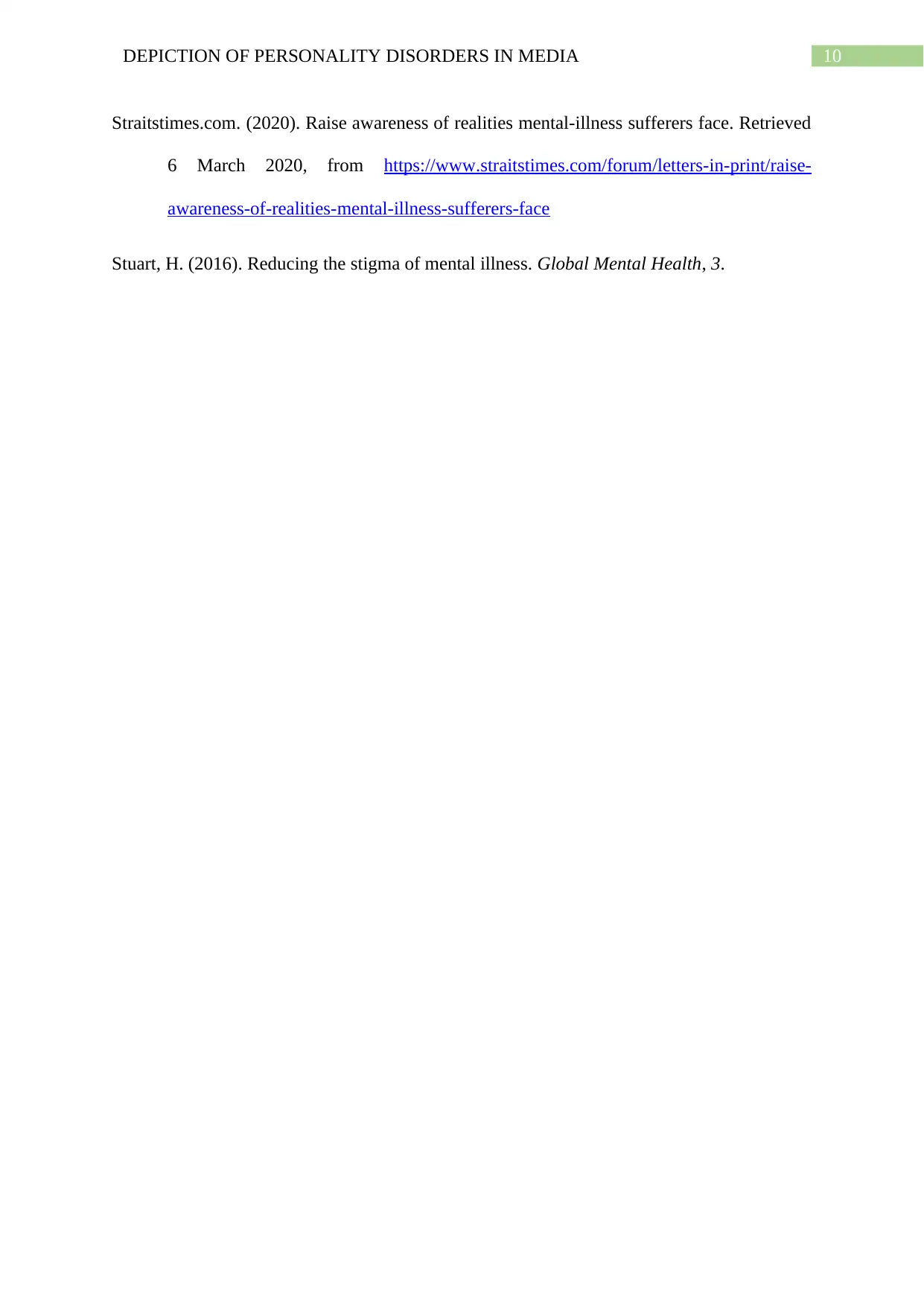
10DEPICTION OF PERSONALITY DISORDERS IN MEDIA
Straitstimes.com. (2020). Raise awareness of realities mental-illness sufferers face. Retrieved
6 March 2020, from https://www.straitstimes.com/forum/letters-in-print/raise-
awareness-of-realities-mental-illness-sufferers-face
Stuart, H. (2016). Reducing the stigma of mental illness. Global Mental Health, 3.
Straitstimes.com. (2020). Raise awareness of realities mental-illness sufferers face. Retrieved
6 March 2020, from https://www.straitstimes.com/forum/letters-in-print/raise-
awareness-of-realities-mental-illness-sufferers-face
Stuart, H. (2016). Reducing the stigma of mental illness. Global Mental Health, 3.
1 out of 11
Related Documents
Your All-in-One AI-Powered Toolkit for Academic Success.
+13062052269
info@desklib.com
Available 24*7 on WhatsApp / Email
![[object Object]](/_next/static/media/star-bottom.7253800d.svg)
Unlock your academic potential
Copyright © 2020–2026 A2Z Services. All Rights Reserved. Developed and managed by ZUCOL.





